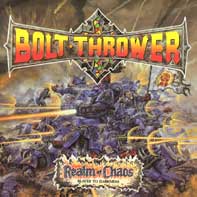Just in time for Metal Monday and by pure coincidence, I found the following: Heavy Fundametalisms: Music, Metal & Politics, “a snapshot of the Second Global Conference of Heavy Fundametalisms: Music, Metal and Politics held in Salzburg, November 2009”. Yes, apparantly there are now academic conferences on heavy metal, but then again, there are academic conferences on everything these days. I found this book via a post at Kings of War, which focused on the relationship between heavy metal and war.

Which brings us neatly to the subject of today’s Metal Monday: Bolt Thrower, the grindcore/death metal band from Coventry. Grindcore is a mixture of death & thrash metal influences with hardcore punk style, with short and sharp songs, fast guitars and fast, pounding drums with little sophistication. Perhaps the most famous grindcore band is Naplam Death; Bolt Thrower started out with a similar sound but migrated to a more standard death metal, even doom metal approach: slower with lower tuned guitars and drums. In both incarnations their subject matter remained the same: war, both fictional and historical. Their first album even featured artwork from Games Workshop’s Warhammer 40,000 RPG, which is set in a brutal future where a fascist human empire are the good guys. Don’t think that Bolt Thrower glorifies war however; their best album, The IVth Crusade is a concept album showcasing the madness and folly of war. Not a particularly original theme, but brought powerfully. Of course, like so many other metal bands, Bolt Thrower is not blind to the “kewl” side of war, so there remains a tension between this adolescent fascination with wartoys and the genuine revulsion of the results of it…
The IVth Crusade:
Cenotaph:
For Victory:
What’s your favourite Bolt Thrower track?